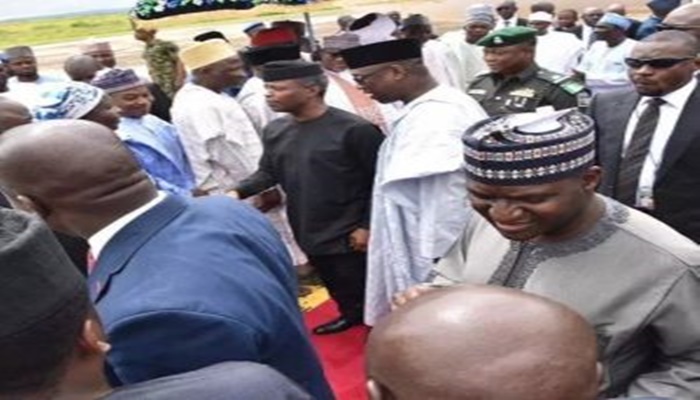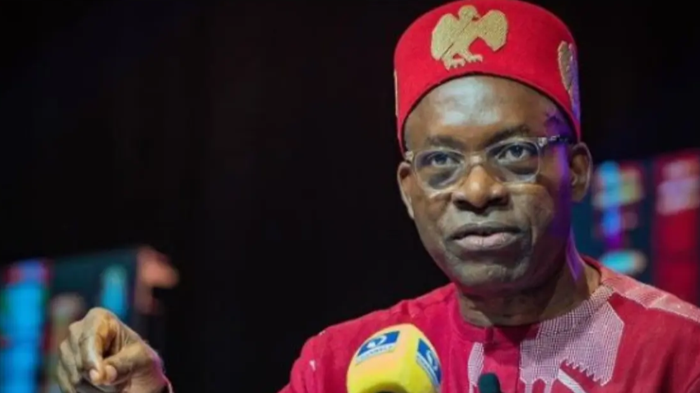Osinbajo says Nigerian states are undiscovered jewels, with huge local & international economic potentials

• Challenges Niger State to envision possibility of feeding half of Africa
Acting President Yemi Osinbajo, SAN,has said that just one state in the country, Niger State, with its rich agricultural potentials and resources should develop the capacity to feed both the country and about half of the African continent.
The Acting President made the statement in Minna on Monday at the Investment Summit organised by Niger State tagged “Truly Niger” to showcase the rich potentials of the State to investors.
“Indeed, this State like most of Nigeria is largely an undiscovered jewel; a real treasure hiding in plain sight. The vision is to position Niger State to feed at least 50% of Africa. This may sound like a tall order given today’s level of production. But we should always set our sights high.”
Delivering the keynote address as Special Guest of Honour at the ceremony chaired by former President Olusegun Obasanjo, the Acting President spoke on the theme Impacting Investment For Advancing Agricultural Economy and Innovation stating that “even in the best days of oil dominance in Nigeria, agriculture provided jobs for 30 percent of our population, and about the same percentage in contribution to GDP.”
Continuing, he noted that Agriculture is clearly the surest pathway to diversifying the economy, ensuring food security and improving foreign exchange earnings.
Speaking to industry chieftains, bankers, financial experts and senior government officials at the Legbo Kutigi International Conference Centre, in Minna, Prof Osinbajo noted that Niger State “boasts of size, occupying 10% of Nigeria’s land area, this is perhaps the largest tracts of arable land in the sub-region, the largest number of hydro-power assets, a hardworking, resourceful, youthful population and an experienced and purposeful leadership.”
He noted that the State “is rightly proactively seeking sustainable, long-term investments that will support the inclusive, sustainable and resilient growth and development that the State needs. I expect that the summit will deliver the connections, the networks and investment collaboration that it was designed for.”
Before declaring the investment summit open, Prof. Osinbajo recalled the efforts of the Niger State government to make the State more business-friendly, and implored the State government to leverage on existing measures such as the creation of the Niger State Geographic Information System (NIGIS); the streamlined issuance of certificates of occupancy within 72 hours; and the reduction in the cost of getting a Certificate of Occupancy by 90% (from between N150,000 – N180,000) to only N15,000 to achieve its investment objectives.
Osinbajo noted that the State must utilize “its advantage of being close to New York, a model which Ogun State is also successfully implementing in relation to Lagos State, ” adding that the State must take advantage of its location close to the Federal Capital Territory to become a manufacturing hub.
“This is especially the case for Small and Medium enterprises that can produce light manufacturers to serve the rapidly growing population of Abuja,” the Acting President stated.
During his remarks at the occasion, the Governor of the State, Alhaji Sani Bello said the summit was conceived to showcase the rich agricultural potentials of the State to investors, promising that the outcome of the summit would be implemented by his government.
Dignitaries at the event include besides, former President Obasanjo included the former Head of State, Gen. Abdulsalam Abubakar; Governor of Sokoto State, Aminu Waziri Tambuwal; Deputy Governor of Niger State, Alhaji Ahmed Kesto; Minister of Agriculture, Chief Audi Ogbeh; Minister of Women Affairs, Hajia Aisha Jummai Al-Hassan; Minister of State for Aviation, Senator Hadi Sirika; Minister of State for Solid Minerals, Alh Bawa Bwari; Minister of State for Trade, Industry and Investment, Hajia Aisha Abubakar, the Sultan of Sokoto, His Eminence, Muhammad Sa’ad Abubabkar and several other top government officials.






